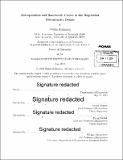Extrapolation and bandwidth choice in the regression discontinuity design
Author(s)
Rokkanen, Miikka
DownloadFull printable version (9.031Mb)
Other Contributors
Massachusetts Institute of Technology. Department of Economics.
Advisor
Joshua Angrist and Parag Pathak.
Terms of use
Metadata
Show full item recordAbstract
This thesis consists of three methodological contributions to the literature on the regression discontinuity (RD) design. The first two chapters develop approaches to the extrapolation of treatment effects away from the cutoff in RD and use them to study the achievement effects of attending selective public schools, known as exam schools, in Boston. The third chapter develops an adaptive bandwidth choice algorithm for local polynomial regression-based RD estimators. The first chapter develops a latent factor-based approach to RD extrapolation that is then used to estimate effects of exam school attendance for infra-marginal 7th grade applicants. Achievement gains from Boston exam schools are larger for applicants with lower English and Math abilities. I also use the model to predict the effects of introducing either minority or socioeconomic preferences in exam school admissions. Affirmative action has modest average effects on achievement, while increasing the achievement of the applicants who gain access to exam schools as a result. The second chapter, written jointly with Joshua Angrist, develops a covariate-based approach to RD extrapolation that is then used to estimate effects of exam school attendance for infra-marginal 9th grade applicants. The estimates suggest that the causal effects of exam school attendance for applicants with running variable values well away from admissions cutoffs differ little from those for applicants with values that put them on the margin of acceptance. The third chapter develops an adaptive bandwidth choice algorithm for local polynomial regression-based RD estimators. The algorithm allows for different choices for the order of polynomial and kernel function. In addition, the algorithm automatically takes into account the inclusion of additional covariates as well as alternative assumptions on the variance-covariance structure of the error terms. I show that the algorithm produces a consistent estimator of the asymptotically optimal bandwidth and that the resulting regression discontinuity estimator satisfies the asymptotic optimality criterion of Li (1987). Finally, I provide Monte Carlo evidence suggesting that the proposed algorithm also performs well in finite samples.
Description
Thesis: Ph. D., Massachusetts Institute of Technology, Department of Economics, 2014. Cataloged from PDF version of thesis. Includes bibliographical references (pages 150-160).
Date issued
2014Department
Massachusetts Institute of Technology. Department of EconomicsPublisher
Massachusetts Institute of Technology
Keywords
Economics.